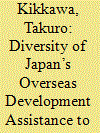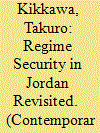| Srl | Item |
| 1 |
ID:
160486


|
|
|
|
|
| Summary/Abstract |
This article analyzes Japan’s Overseas Development Assistance (ODA) policy in Jordan, focusing primarily on the areas concerning security. After the oil shock in 1973, security concerns in the Middle East affected Japan’s economic security policy. However, Japan’s long vulnerability in energy supply was not the sole determinant of its aid policies in the Middle East. Rather, a paradigm shift in the Japanese government’s ODA policy in the 1990s, the implementation of the human security approach, had a greater impact than economic security in subsequent Japanese ODA programs in Jordan. Japan has given more assistance to areas relevant to military security in its ODA in Jordan, particularly after increasing security concerns about the Middle East since the early twenty-first century. The two phenomena—Japan’s more aggressive commitment in the Middle East, including its deployment of Japan Self-Defense Forces (JSDF) in the region and Jordan’s greater responsibility in regional security—occurred simultaneously because of a series of crises after 2003. The unusual nature of Jordanian society today, a small society that hosts refugees from many nations, means the new Japanese ODA approach in Jordan has more diverse recipients than ever, as the country is becoming a host for a community of refugees.
|
|
|
|
|
|
|
|
|
|
|
|
|
|
|
|
| 2 |
ID:
180316


|
|
|
|
|
| Summary/Abstract |
Jordan is one of the few authoritarian Arab regimes that survived region-wide mass protests during the Arab Spring, although the monarchy lacked enough force or resources to neutralize the dissident. This study analyzes the source of the resiliency of the Hashemite monarchy during 2011–2020 concerning regime security. The retreat of the Jordanian democratization movements in the early phase of the Arab Spring was the consequence of the opposition’s failure to achieve coordination and alignment, particularly the internal struggle of the Muslim Brotherhood regarding how to respond and its successful co-optation by the government. The scope of regime security in Jordan experienced a dramatic shift from appeasement to coercion around 2014 because of the eroding social order in neighboring states, represented by the influx of Syrian refugees into Jordan and the rise of the Islamic State in Iraq. Actions for securitization against Islamists, namely increased policing and tighter border control, were arranged through coercion and securing mass support in tandem. Jordan’s experience illustrates how this typically “weak state” secured its survival in this unprecedented, rapidly changing security situation.
|
|
|
|
|
|
|
|
|
|
|
|
|
|
|
|